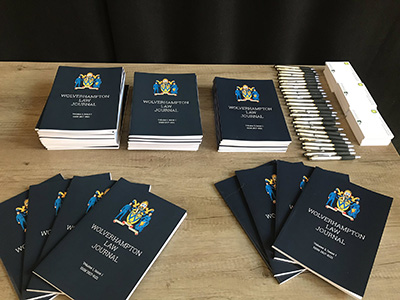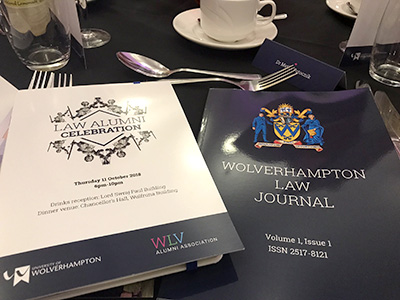Wolverhampton Law Journal: Open Access to Law Research

Summer 2018 was the year, in which the editorial board of the Wolverhampton Law Journal (WLJ) first came together. Members of the Law Research Centre include law and criminal justice experts, many of whom served on editorial boards before. In addition to the author, the board includes: Dr Lezélle Jacobs (editor in chief), Dr Dave Cox, Sukhninder Panesar, and Professor Pete Walton. With plenty of policies to be determined, open access would be instrumental to the accessibility of research published therein. WLJ, as a journal of the ‘University of Opportunity’ remains dedicated to sharing research with communities, who traditionally might not have access to expensive subscription-based services. This includes our Transnational Partners (TNE), whose graduates will want to stay connected with the creative ideas, research and innovation at Wolverhampton.
To maximise its reach, WLJ opted for a free, gold open access for all its published materials. Currently, WLJ stands at four issues strong, with a December 2020 (fifth) issue being in the works. In order to achieve truly open access status, and resultingly be listed on the Directory of Open Access Journals (DOAJ) [https://doaj.org] in August 2020, several policies had to be put in place. First, WLJ made it clear that all copyright and related intellectual property rights remain with their authors, and that there are no fees attached with either the submission, review or publication process. That notwithstanding, WLJ wanted a full, yet transparent dissemination of its publications. To clarify the rules of further use, all authors and the journal adhere to the Attribution-NonCommercial 4.0 International (CC BY-NC 4.0) Creative Commons Licence.
It was a learning curve to discover, that “simply sharing or posting” materials online, without any access charges, will not suffice when thinking of truly open access. Express declarations are needed to ensure not only fee-free process, but also transparency in all future uses. In addition, free resources are not always seen as reliable and their origin questionable. To overcome this barrier, WLJ followed the traditional model in academic publishing, which embeds a double-blind peer review in its publication process. All of the above, together with some technical requirements, satisfied the rigorous checks of a DOAJ listing.
This model is necessarily based on the time of researchers working at the Law Research Centre. Additionally, the double-blind peer review process is only possible with the dedication, commitment and participation of the numerous academics, who act as reviewers, in support of WLJ publications. In the end, we should also not forget the authors of the published works, who dedicate much time to publishing their research. Taken all together, this is a cost of an open access journal, which is carried by the researchers and their institutions. Whether there is a suitable alternative to this model, under which academics write, publish and review research for free, cannot be answered easily. At present, the traditional academic publishing model’s challenges notwithstanding, WLJ is committed to the distribution of law and criminal justice research, without any charges to the readers.


For more information please contact the Corporate Communications Team.


/prod01/wlvacuk/media/departments/digital-content-and-communications/images-2024/Diane-Spencer-(Teaser-image).jpg)
/prod01/wlvacuk/media/departments/digital-content-and-communications/images-18-19/220325-Engineers_teach_thumbail.jpg)
/prod01/wlvacuk/media/departments/digital-content-and-communications/images-2024/241024-Dr-Christopher-Stone-Resized.jpg)
/prod01/wlvacuk/media/departments/digital-content-and-communications/images-2024/241014-Cyber4ME-Project-Resized.jpg)
/prod01/wlvacuk/media/departments/digital-content-and-communications/images-2024/240315-Research-Resized.jpg)